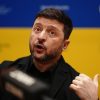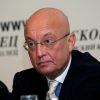For a man who has spent much of 2020 in social isolation, it has been a busy year for Vladimir Putin. He changed Russia’s constitution to allow himself to stay in power potentially until 2036; acted to retain influence over his “near abroad” as protests erupted in Belarus and conflict flared in Nagorno-Karabakh; and, according to a wealth of evidence released this week, ordered the assassination of his leading political opponent with a chemical weapon.
As news breaks of one of the biggest and most significant hacks of the US government in history, with Russia the prime suspect, it seems that Putin and his intelligence services may have retained their appetite for audacious, controversial moves, six years after the annexation of Crimea and four years after the alleged interference to aid Donald Trump’s election campaign.
As Trump’s time in the White House comes to an end, Putin will enter his 22nd year as the leading politician in Russia. But the attack on the opposition leader Alexei Navalny, who survived, suggests a leader and a regime worried, and not at all confident, about the future.
Putin is a much shrewder and more popular politician than the Belarusian president, Alexander Lukashenko, but the speed with which the consensus of support for the latter evaporated in Russia’s neighbour made for uncomfortable viewing for Kremlin decision-makers. A sustained protest movement in the far eastern city of Khabarovsk has tailed off but raised alarm about the potential for unrest in the outer regions.
All this comes amid the Covid-19 pandemic, with Russia’s economy no more insulated than any other, and Putin’s approval ratings dropping to levels not seen since before 2014.
Russian scientists have been hard at work developing a Covid vaccine as part of the international competition to end the pandemic. Despite pressure to rush out the vaccine as a global first, and reports of government employees being forced to take part in voluntary trials, the data suggests that Russia’s vaccine may be a success. (That said, despite trumpeting the achievement, Putin has declined to take it so far.)
The name, Sputnik V, harks back to the space race and is a clear sign that Putin hopes the vaccine will be a boost to Russia’s international reputation. “It’s part of the Russian mentality to save the world,” said Kirill Dmitriev, the man Putin has put in charge of promoting the vaccine internationally, in an interview with the Guardian earlier this year.
But even if the vaccine is a success, the chemical attack on Navalny is likely to be remembered as the most extraordinary Russian medical story of 2020, just as the annexation of Crimea overshadowed Putin’s big plans for the 2014 Sochi Olympics to showcase Russia’s return to the world stage.
The Kremlin has been accused of many murders before, but in cases such as Alexander Litvinenko and Sergei Skripal, both poisoned in Britain, the targets were defectors – a group that Putin has previously put in a different category to opponents. If the Bellingcat allegations about Navalny are true then the regime may have entered a new and dangerous phase.
Putin, of course, brushed off the allegations during his traditional marathon press conference on Thursday, held this time under socially distanced conditions. “If they’d wanted to [poison Navalny] then they probably would have finished the job,” he said, in not the most convincing of denials.
Putin also touched on many of his old favourites during the four-hour session, promising callers he would take up their problems with local leaders, bemoaning the lack of international appreciation for the Soviet victory in the second world war and attacking the hypocrisy of those in the west who lecture him.
“In comparison to you, we are soft and fluffy,” Putin told a BBC correspondent who had asked whether Russia bore responsibility for the worsening in relations of late.
The analyst Mark Galeotti wrote of Putin’s performance: “Honestly, if someone said this Putin presser was a deep-fake, AI-curated compilation of his past hits and tropes, I wouldn’t be surprised.”
Putin, when asked whether he had changed the constitution because he really wanted to stay in power until 2036 or because he did not want to be a “lame duck” as the end of his current term approached, said he had not yet decided whether he wanted to stay on.
“There is a universal rule: will it be for the good of the country? If it will then we should do it, if it won’t then we shouldn’t,” he said.
A similar logic presumably also applies to decisions taken over Crimea, over hacking and over poisoning attacks. But there is a problem for all rulers without significant checks and balances as they spend longer and longer in office: the concepts of what is good for the country and of what is good for the leader begin to merge.























































Свежие комментарии